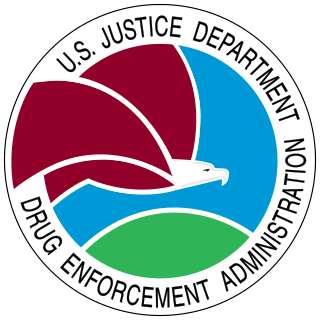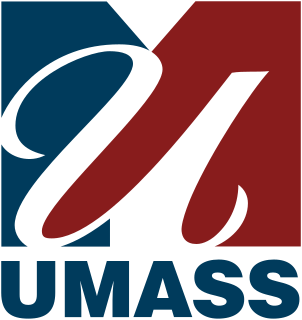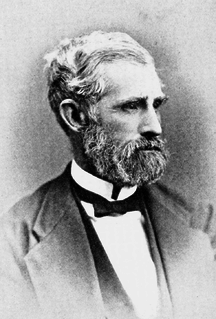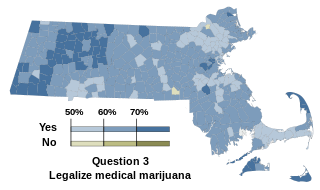External links
- "DEA Lawsuit Supporting Prof. Craker's Proposed UMass Amherst Marijuana Production Facility". Multidisciplinary Association for Psychedelic Studies.
Lyle E. Craker was a Professor in the Department of Plant, Soil and Insect Sciences at the University of Massachusetts Amherst. [1] Since 2001, Craker has been trying to obtain a permit from the United States Drug Enforcement Administration (DEA) to grow marijuana for research purposes. [2] He died in May 2022. [3] [4]
In 1963, Craker received a B.S. degree in agronomy from the University of Wisconsin, Madison. In 1967 he received a Ph.D. in agronomy and plant genetics with a specialty in plant physiology from the University of Minnesota. In 1976 he received an associate degree in business administration from Massachusetts Bay Community College. [1]
Craker is known for proposing that medical grade marijuana be available for scientific studies into its possible health benefits. Since the marijuana available for studies is too weak for any kind of medical study, he proposed that medical grade marijuanna be made available for research purposes. He has been named in many newspapers on this subject. The federal government refuses to give him a license to grow medical grade marijuana. On April 29, 2009, Senators Edward M. Kennedy and John F. Kerry wrote a letter to the Honorable David W. Ogden urging the Deputy Attorney General to delay a final decision on the application by Lyle E. Craker of the University of Massachusetts Amherst to produce research-grade marijuana for use in federally approved clinical trials [5] [2] [6] [7]

The Drug Enforcement Administration is a United States federal law enforcement agency under the U.S. Department of Justice tasked with combating drug trafficking and distribution within the U.S. It is the lead agency for domestic enforcement of the Controlled Substances Act, sharing concurrent jurisdiction with the Federal Bureau of Investigation, the U.S. Immigration and Customs Enforcement, and U.S. Customs and Border Protection. The DEA has sole responsibility for coordinating and pursuing U.S. drug investigations both domestically and abroad.

Proposition 215, or the Compassionate Use Act of 1996, is a California law permitting the use of medical cannabis despite marijuana's lack of the normal Food and Drug Administration testing for safety and efficacy. It was enacted, on November 5, 1996, by means of the initiative process, and passed with 5,382,915 (55.6%) votes in favor and 4,301,960 (44.4%) against.

The University of Massachusetts Amherst is a public research university in Amherst, Massachusetts and the sole public land-grant university in Commonwealth of Massachusetts. Founded in 1863 as an agricultural college, it is the flagship and the largest campus in the University of Massachusetts system, as well as the first established. It is also a member of the Five College Consortium, along with four other colleges in the Pioneer Valley: Amherst College, Smith College, Mount Holyoke College, and Hampshire College.

The University of Massachusetts is the five-campus public university system and the only public research system in the Commonwealth of Massachusetts. The university system includes five campuses, a satellite campus in Springfield and also 25 campuses throughout California and Washington with the University of Massachusetts Global.
The Multidisciplinary Association for Psychedelic Studies (MAPS) is an American nonprofit organization working to raise awareness and understanding of psychedelic substances. MAPS was founded in 1986 by Rick Doblin and is now based in San Jose, California.

In the United States, the removal of cannabis from Schedule I of the Controlled Substances Act, has been proposed repeatedly since 1972. The category is the most tightly restricted category reserved for drugs that have "no currently accepted medical use.”

Mary Jane Rathbun, popularly known as Brownie Mary, was an American medical cannabis rights activist. As a hospital volunteer at San Francisco General Hospital, she became known for baking and distributing cannabis brownies to AIDS patients. Along with activist Dennis Peron, Rathbun lobbied for the legalization of cannabis for medical use, and she helped pass San Francisco Proposition P (1991) and California Proposition 215 (1996) to achieve those goals. She also contributed to the establishment of the San Francisco Cannabis Buyers Club, the first medical cannabis dispensary in the United States.

The Isenberg School of Management is the business school at the University of Massachusetts Amherst, the flagship campus for the University of Massachusetts system, located in Amherst, Massachusetts, United States. The Isenberg School is accredited by the AACSB International and ACPHA.

Levi Stockbridge was a farmer and scientist from Hadley, Massachusetts. He was instrumental in the early history of the Massachusetts Agricultural College now known as the University of Massachusetts Amherst.

The Stockbridge School of Agriculture offers Associate of Science, Bachelor of Science, and graduate degrees as an academic unit of the University of Massachusetts Amherst campus. It was founded as part of the Massachusetts Agricultural College in 1918.

In the United States, increased restrictions and labeling of cannabis as a poison began in many states from 1906 onward, and outright prohibitions began in the 1920s. By the mid-1930s cannabis was regulated as a drug in every state, including 35 states that adopted the Uniform State Narcotic Drug Act. The first national regulation was the Marihuana Tax Act of 1937.

The use, sale, and possession of cannabis over 0.3% THC in the United States, despite laws in many states permitting it under various circumstances, is illegal under federal law. As a Schedule I drug under the federal Controlled Substances Act of 1970, cannabis over 0.3% THC is considered to have "no accepted medical use" and have a high potential for abuse and physical or psychological dependence. Cannabis use is illegal for any reason, with the exception of FDA-approved research programs. However, individual states have enacted legislation permitting exemptions for various uses, including medical, industrial, and recreational use.

In the United States, the use of cannabis for medical purposes is legal in 37 states, four out of five permanently inhabited U.S. territories, and the District of Columbia, as of February 2022. Eleven other states have more restrictive laws limiting THC content, for the purpose of allowing access to products that are rich in cannabidiol (CBD), a non-psychoactive component of cannabis. There is significant variation in medical cannabis laws from state to state, including how it is produced and distributed, how it can be consumed, and what medical conditions it can be used for.
Wo/Men's Alliance for Medical Marijuana (WAMM) is a not-for-profit medicinal cannabis dispensing collective located in Santa Cruz, California. WAMM was founded in 1993 by Valerie Leveroni Corral and her then-husband Michael Corral. Valerie Corral is also the Executive Director of Raha Kudo: Design for Dying Project, a non-profit corporation that provides education and research to support persons facing death and their caregivers. Members of WAMM receive organic medicinal cannabis at cost while volunteers trade work for cannabis. There is a compassion program for those unable to afford the full cost of medical cannabis. WAMM was the first medical marijuana collective to receive non-profit status from the United States Government.

The campus of the University of Massachusetts Amherst is located nearly entirely in Amherst, Massachusetts, United States, with a portion located in Hadley. Founded on 310 acres in rural Western Massachusetts, the campus has grown to nearly 1,450 acres.

The Massachusetts Medical Marijuana Initiative, appeared as the third question on the state's 2012 ballot as an indirect initiated state statute. The measure allows cannabis to be used for medical purposes in the state. The initiative—backed by the American Civil Liberties Union, the Massachusetts Patient Advocacy Alliance, and the Committee for Compassionate Medicine—was filed with proponents turning in the required signatures to the Massachusetts Attorney General's office by the August 3, 2011 deadline. Those signatures were needed for the required ten qualified voters who submitted the original petition to put forward the full text of the law they want enacted. The initiative passed with support from 63% of state voters.

The University of Massachusetts Amherst College of Natural Sciences (CNS) is the largest school at the University of Massachusetts Amherst. The College of Natural Sciences consists of thirteen departments ranging from the physical to the life sciences and two schools, the Stockbridge School of Agriculture and the School of Earth and Sustainability. In addition, CNS hosts numerous institutes and centers promoting national and international collaboration in scientific research across disciplines.
The consumption of Cannabis in Costa Rica is nominally illegal; however, personal consumption does not carry any criminal penalties. The sale of marijuana, however, can be punished criminally. As of March 2022 medicinal cannabis has been approved.
Medical cannabis research includes any medical research on using cannabis. Different countries conduct and respond to medical cannabis research in different ways.
Marcellette ("Marci") Gaillard-Gay Williams is an American retired academic administrator who served as interim chancellor of the University of Massachusetts Amherst from July 2001 until July 2002. She was the university's eighth chancellor and the first woman to serve in the position.